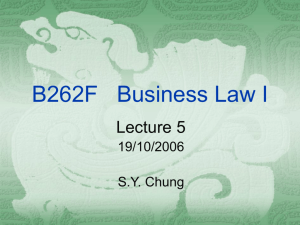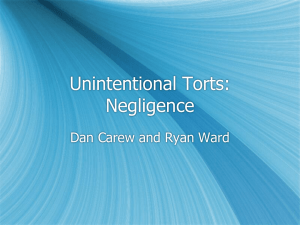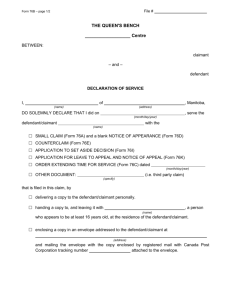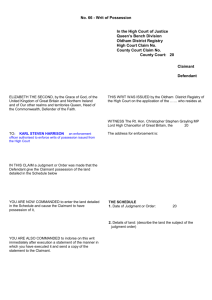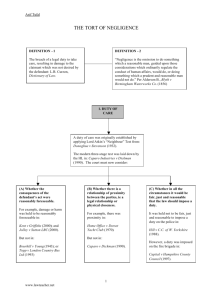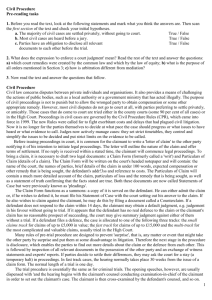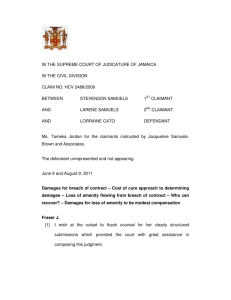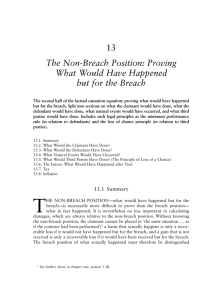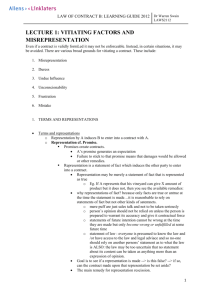cnt03lec
advertisement
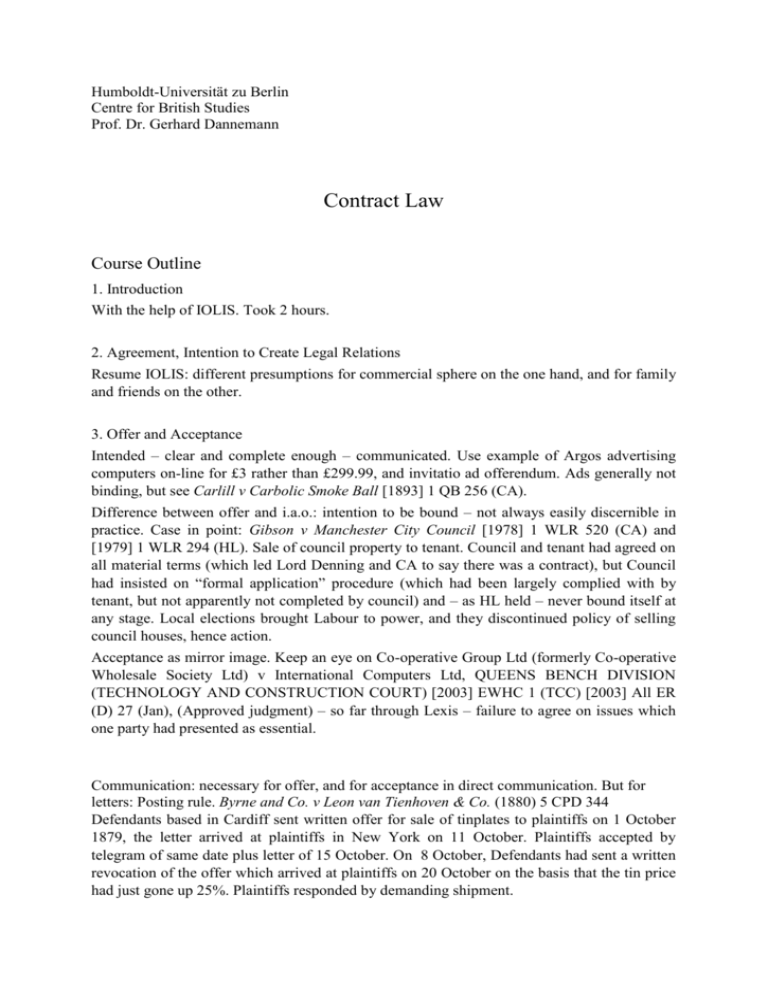
Humboldt-Universität zu Berlin Centre for British Studies Prof. Dr. Gerhard Dannemann Contract Law Course Outline 1. Introduction With the help of IOLIS. Took 2 hours. 2. Agreement, Intention to Create Legal Relations Resume IOLIS: different presumptions for commercial sphere on the one hand, and for family and friends on the other. 3. Offer and Acceptance Intended – clear and complete enough – communicated. Use example of Argos advertising computers on-line for £3 rather than £299.99, and invitatio ad offerendum. Ads generally not binding, but see Carlill v Carbolic Smoke Ball [1893] 1 QB 256 (CA). Difference between offer and i.a.o.: intention to be bound – not always easily discernible in practice. Case in point: Gibson v Manchester City Council [1978] 1 WLR 520 (CA) and [1979] 1 WLR 294 (HL). Sale of council property to tenant. Council and tenant had agreed on all material terms (which led Lord Denning and CA to say there was a contract), but Council had insisted on “formal application” procedure (which had been largely complied with by tenant, but not apparently not completed by council) and – as HL held – never bound itself at any stage. Local elections brought Labour to power, and they discontinued policy of selling council houses, hence action. Acceptance as mirror image. Keep an eye on Co-operative Group Ltd (formerly Co-operative Wholesale Society Ltd) v International Computers Ltd, QUEENS BENCH DIVISION (TECHNOLOGY AND CONSTRUCTION COURT) [2003] EWHC 1 (TCC) [2003] All ER (D) 27 (Jan), (Approved judgment) – so far through Lexis – failure to agree on issues which one party had presented as essential. Communication: necessary for offer, and for acceptance in direct communication. But for letters: Posting rule. Byrne and Co. v Leon van Tienhoven & Co. (1880) 5 CPD 344 Defendants based in Cardiff sent written offer for sale of tinplates to plaintiffs on 1 October 1879, the letter arrived at plaintiffs in New York on 11 October. Plaintiffs accepted by telegram of same date plus letter of 15 October. On 8 October, Defendants had sent a written revocation of the offer which arrived at plaintiffs on 20 October on the basis that the tin price had just gone up 25%. Plaintiffs responded by demanding shipment. 2 Lindley J p. 347: no authority on whether withdrawal has any effect before it is communicated. Rejects Pothier who thinks there is no contract for lack of consent. Then refers to US judgments and Pollock. P. 348: withdrdawal was inoperative as contract had been concluded on 11 October. The other result would produce “extreme injustice and inconvenience”. Difficulties with offer and acceptance model: complicated negotiations, inclusion of standard forms, or worst: combinations of battle of forms with complicated negotiations. IOLIS: Having considered non-instantaneous communication by post, what about non-instantaneous communication by more modern means such as fax, email or voice mail? The choice might appear to be between either (i) extending the postal rule to these other forms of communication or (ii) requiring that acceptance be actually received - i.e. the instantaneous communication rule. However, In Brinkibon v Stahag Stahl [1983] 2 AC 34 (HL), Lord Wilberforce declined to adopt either solution. Instead, he said: No universal rule can cover all such cases: they must be resolved by reference to the intentions of the parties, by sound business practice and in some cases by a judgment where the risks should lie. Prima facie this may seem like a reasonable standpoint. The problem is, though, that for the millions of parties wishing to make contracts via these modern means of communication how can they possibly know where they stand? Important to remember that if there is an offer which has been accepted, there is a contract which is enforceable – it is often not fully realised by commercial parties that contracts can be valid prior to any performance or reliance by either party. 4. Consideration and Form Consideration, particular feature of English law. Classical definition in: Currie v Misa (1875) LR 10 Ex 153: “a valuable consideration, in the sense of the law, may consist either in some right, interest, profit or benefit accruing to the one party, or some forbearance, detriment, loss or responsibility given suffered, or undertaken by the other.” No examination whether it is adequate – it can be as trivial as chocolate wrappers in Chappell & Co v Nestlé [1960] AC 87 (copyright case, but established that buyers who submitted wrappers which Nestlé threw away provided consideration). Detriment: using the carbolic smoke ball regularly was sufficient in that case. Not very clear on subjective or objective or value oriented views – “practical benefit” sufficient in Williams v Roffey Bros & Nichools (Contractors) Ltd [1991] 1 QB 1 (CA)– at the same time an example for consideration and changing existing contracts. 3 Claimant were sub-contractors to def main contractors, and were to provide carpentry work to building. Claimant had accepted a price too low to make profit. Def had accepted penalty clause with client for late completion. Oral agreement of additional payment, some £10,000 in total, which def then did not pay. Discusses Stilk v Myrick – after desertion of two seamen, promise to others to divide the wage of deserters between others if they brought the ship back to London, dishonoured, action disallowed. Glidewell LJ also weaves in economic duress and arrives at the following conclusion pp. 15-16: “(i) if A has entered into a contract with B to do work for, or to supply goods or services to, B in return for payment by B; and (ii) at some stage before A has completely performed his obligations under the contract B has reason to doubt whether A will, or will be able to, complete his side of the bargain; and (iii) B thereupon promises A an additional payment in return for A’s promise to perform [16] hi contractual obligations on time; and (iv) as a result of giving his promise, B obtains in practice a benefit, or obviates a disbenefit; and (v) B’s promise is not given as a result of economic duress or fraud on the part of A; then (vi) the benefit bo B is capable of being consideration for B’s promise, so that the promise will be legally binding.” Consideration must move from claimant. And must not be past (see: change of contract). Form: deed (written and witnessed), e.g. gifts, lease for more than three years, in writing (Bills of Exchange, contract of guarantee etc), evidenced in writing (Statute of Frauds, 1677), no form (most contracts). Functions: evidence, caution 4 5. Mistake and Misrepresentation Misrepresentation: 1. During contractual negotiations, 2. one party represents facts, 3. which are material to the contract, 4. on which the other party relies, 5. which causes the other party to enter into the contract, 6. as was intended by the one party. Misrepresentations can be fraudulent, negligent, or innocent. The difference lies in the consequences. All three types allow the other party – at its choice – to rescind the contract. Negligent and fraudulent misrepresentation allow the other party to claim damages. Courts have a discretion as to whether they want to award some damages in case of innocent misrepresentation. (Very simplified.) And if misrepresentations – e.g. as to quality of goods supplied – become part of the contract, damages can be claimed regardless of the state of mind of the party making the representation. Misrepresentation Act 1967. Lesson for English law: as a recipient of goods or services, ask a lot… and be careful what you state if you are the seller/supplier. Distinguish relief for misrep from incorporation of terms (warranty or the like). Misrep prior to conclusion of contract. Causal link necessary. Mistake: only crucial mistakes qualify. See: Great Peace Shipping v Tsavliris Salvage [2002] EWCA Civ 1407, [2002] 4 All ER 689, [2002] 2 Lloyd's Rep 653. Defendants had contracted to salvage a stricken vessel, the Cape Providence. It would take them six to seven days to reach the ship. They contacted the claimants, owners of the Great Peace, which they believed to be at a distance of some 35 miles when they concluded a contract for chartering the Great Peace for the purpose of saving the crew of Cape Providence, if necessary, and for standing by for five days. Two hours after conclusion of the contract, defendants found out that the distance between the two ships was actually 410 miles. They told claimants that they might cancel the contract, but not before they had found a nearer ship – which they did. They refused to pay the negotiated cancellation fee (five days hire) on the ground of common mistake. Lord Phillips, speaking per curiam, held that defendants were liable for the cancellation fee. The mistake was not of a nature which would have fundamentally altered the nature of the contract, as the Great Peace could have performed, as evidenced by the fact that defendants held on to contract until they found a closer ship. (Lots more for the initiated: in contrast to Solle v Butcher, no relief available in equity if no mistake under common law). Remember: mistake and misrep relate to facts at the time of the conclusion of the contract. Mispredictions about future developments can be considered under the doctrine of frustration. Use: Griffith v Brymer (1903) 19 TLR 434 (KBD) Coronation case; void on ground of common mistake, because entered into after surgery on King had been agreed. Frustration of Contract: 5 Krell v Henry [1903] 2 KB 740 (CA) Coronation case. Held that frustration applies "to cases where the event which renders the contract incapable of performance is the cessation or non-existence of an express condition or state of things, going to the root of the contract, and essential to its performance." Ocean Tramp Tanker Corp v V/O Sovfracht (The Eugenia) [1964] 2 QB 226 (CA) chk! (Ship became stuck in Suez Canal, but it was argued that contract would have been frustrated if she had stayed outside.) Lord Denning: no room for implied term, in particular since parties had started debating the issue of an eventual blocking of the Canal but never resolved it. Quote: Applying these principles to this case, I have come to the conclusion that the blockage of the canal did not bring about a "fundamentally different situation" such as to frustrate the venture. My reasons are these: (1) The venture was the whole trip from delivery at Genoa, out to the Black Sea, there load cargo, thence to India, unload cargo, and redelivery. The time for this vessel from Odessa to Vizagapatam via the Suez Canal would be 26 days, and via the Cape, 56 days. But that is not the right comparison. You have to take the whole venture from delivery at Genoa to redelivery at Madras. We were told that the time for the whole venture via the Suez Canal would be 108 days and via the Cape 138 days. The difference over the whole voyage is not so radical as to produce a frustration. (2) The cargo was iron and steel goods which would not be adversely affected by the longer voyage, and there was no special reason for early arrival. The vessel and crew were at all times fit and sufficient to proceed via the Cape. (3) The cargo was loaded on board at the time of the blockage of the canal. If the con tract was frustrated, it would mean, I suppose, that the ship could throw up the charter and unload the cargo wherever she was, without any breach of contract. (4) The voyage round the Cape made no great difference except that it took a good deal longer and was more expensive for the charterers than a voyage through the canal. LJ Donovan: What resulted from the blockage of the Suez Canal, so far as the present case is concerned, is really that the voyage became more expensive. In all the circumstances, I do not think that such a fundamental change occurred in the relevant circumstances as to make it just and reasonable to relieve the parties of their obligation under the contract by reference to the doctrine of frustration. 6. Duress and Undue Influence Duress: Universe Tankships Inc of Monrovia v International Transport Workers Federation and Others (The Universe Sentinel), [1983] AC 366. Lord Scarman – duress required that: • The victim was subjected to pressure which was illegitimate; and • The pressure exerted on the victim was so great that it gave rise to the compulsion of his/her will. (Copied from IOLIS). 6 Illegitimate: includes threat of unlawful conduct. Duress to person (now e.g. Barton v Armstrong), to goods, now also some types of economic duress, including in particular threatened breach of contract (The Univers. (Go back to Williams v Roffey Bros.) Leading to compulsion. Undue Influence. Will keep it short because it will not be highly relevant to you, unless you work for a bank. Difficult area, and much in move. Careful: IOLIS is outdated, not reflecting Royal Bank of Scotland v Etridge (No. 2) [2001] UKHL 44, [2002] 2 AC 773 Requires: 1. relationship of trust and confidence – actual (to be fully proven) or presumed (husband-wife, parents – young children, solicitor – client, doctor – patient, etc.), 2: what was formerly known as “manifest disadvantage” and now is called (Lord Nicholls): “not readily explainable by the relationship between the parties”. Prima facie evidence to be offered, no longer presumed after RSB v Etridge. Most cases concern securities – guarantees, others involve prezzies. 7 7. Illegality Tinsley v Milligan [1994] 1 AC 340 (HL). Claimant and defendant jointly purchased a house but registered this in the name of the claimant alone so that the defendant could make fraudulent benefit claims. Parties fell out, DSS was told by defendant (or other way round?), claimant moved out and then brought an action seeking possession. Defendant relied on equitable interest. 3-2 majority (B-W, Janucey, Lowry) dismissed appeal in favour of defendant, Goff and Keith would have allowed the appeal. In the CA, Nicholls developed a public conscience test, with court balancing adverse consequences of granting of refusing relief. Rejected by HL, both Goff and B-W. B-W found relief under principles of resulting trust in shares proportionate to the purchase price and held (contrary to Goff) that claimant did not need to rely on the illegality in the present case. St John Shipping Corp. v Joseph Rank Ltd [1957] 1 QB 267 (QBD) 1932. Act providing that a ship “shall not be so loaded as to submerge … the load line”. Ship found out to be overloaded on arrival, master prosecuted and fined. Defendants held bill of lading, paid most but withheld a sum equivalent to the ratio of the overload proportion to the entire freight. Devlin J explained that due to depreciation of currency extra gain (some 2,300) exceeded fine. P. 283: not a contract with the object of committing an illegal act, not a contract which is expressly or impliedly prohibited by statute. Held p. 288 that “contracts for the carriage of goods are not within the ambit of this statute at all.” 8. Frustration – done above. 9. Performance (leave out privity) Keep it simple – but mention that this is the typical case. 10. Breach Simple and unified notion of breach: anything which falls short of performance as owed under the contract. 11. Remedies Damages as primary remedy. Termination of contract only if: Breach of “condition” – so be careful with this term, but see also: Hong Kong Fir Shipping Co v Kawasaki Kishen Kaisha Ltd [1962] 2 QB 26 (CA) (condition, warranty and innominate terms, "seaworthiness" being innominate; various problems, including understaffing in engine room and incompetent staff, but termination nevertheless repudiation. Material breach: See also Cehavve NV v Bremer Handeelsgesellschaft m.b.H (The Hansa Nord) [1976] QB 44 (CA) citrus pulp rejected as not conforming, very same shipment bought through agent at 30% of contract price (prices had fallen) and used for its original purpose. Buyers entitled to damage, but not to rejection. See now sec. 15a Sale of Goods Act as of 1979 Making time of the essence, see Behzadi v Shaftesbury Hotels Ltd [1992] Ch 1 (CA) Contract for the sale of land (two hotels) in which completion dates were set but explicitly without being of essence. Sellers (defendants) had difficulty to deduce title (an intermediary 8 step stipulated in the contract) because unforeseen complications with the Land Registry. After repeated request, buyer (claimant – fem.) wrote letters on 23 August and 30 August making time of essence and indicating buyer’s termination of contract unless title was deduced on 6 September. Buyer declared contract rescinded on 7 September and requested return of advance payment. Nourse LJ states at outset old rule (Smith v Hamilton [1950] 2 All ER 928, [1951] Ch 174): if time was not of essence, there first had to be an unreasonable delay, then time could be made of essence. He agrees with Australian decisions which have abandoned this view. He finds that seller’s solicitors could reasonably have believed to have taken all necessary steps with their first title application to the Land Registry in May. And then: Accepting that the vendor's solicitors could have applied more pressure on the Land Registry, could have made further inquiries of the mortgagee's solicitors and should have kept the purchaser's solicitors better informed, I nevertheless think that with the information which was available on 30 August it was unreasonable to require compliance within no more than seven days. The purchaser's solicitors had not themselves treated the matter as urgent before their letter of 10 August and on 30 August it could not reasonably have been thought that seven days was long enough to enable the vendor to be sure of resolving the difficulties with the Land Registry. And Purchas LJ What, then, is the effect of serving a so-called notice 'making time of the essence'? It certainly does not make time of the essence so far as the obligations in the contract of sale are concerned, since one party cannot unilaterally vary the terms of the contract. It cannot be served until after there has been a breach by the defaulting party either of the term fixing the date for compliance, or of the implied term where the contract is silent as to the date for performance. The notice has in law no contractual import. With the modern practice of including standard conditions into contracts for sale of land, occasions when a date is not prescribed for completion or for the performance of intermediate steps (e g delivering an abstract of title) have become increasingly rare. It is only in such cases that the reasonable time for performance term can be imported into the contract. In most cases, therefore, the effect of the notice will be to give the defaulting party an opportunity to perform his obligations under the contract. However, I see no reason for the imposition of any further period of delay after the breach of contract has been established by non-performance in accordance with its terms before it is open to a party to serve such a notice. The important matter is that the notice must in all the circumstances of the case give a reasonable opportunity for the other party to perform his part of the contract. However, one who elects to serve a notice immediately upon the breach of the contract will be well advised to be cautious in his selection of the period to be included in the notice before he reserves the right to repudiate. Concluding: Accordingly I feel able to adhere to my view that there is no basis in law to require a further period of delay before the service of a notice giving a fixed period for performance, provided that this period is reasonable in all the circumstances. Specific performance: in the discretion of the courts. Standard remedy for little more than contracts for the sale of real property, otherwise rarely granted. See: Co-operative Insurance Society Ltd v Argyll Stores (Holdings) Ltd [1997] 2 WLR 898 (HL) Contract for commercial tenancy, premises in shopping centre to be kept open as supermarket. Supermarket closed down. No specific performance allowed. CA had actually issued 9 injunction which, however, never had taken effect as an assignment had meanwhile been agreed. Lord Hoffmann: Specific performance is traditionally regarded in English law as an exceptional remedy, as opposed to the common law damages to which a successful plaintiff is entitled as of right. There may have been some element of later rationalisation of an untidier history, but by the 19th century it was orthodox doctrine that the power to decree specific performance was part of the discretionary jurisdiction of the Court of Chancery to do justice in cases in which the remedies available at common law were inadequate. This is the basis of the general principle that specific performance will not be ordered when damages are an adequate remedy. By contrast, in countries with legal systems based on civil law, such as France, Germany and Scotland, the plaintiff is prima facie entitled to specific performance. The cases in which he is confined to a claim for damages are regarded as the exceptions. In practice, however, there is less difference between common law and civilian systems than these general statements might lead one to suppose. And also: It is true that the defendant has, by his own breach of contract, put himself in such an unfortunate position. But the purpose of the law of contract is not to punish wrongdoing but to satisfy the expectations of the party entitled to performance. A remedy which enables him to secure, in money terms, more than the performance due to him is unjust. From a wider perspective, it cannot be in the public interest for the courts to require someone to carry on business at a loss if there is any plausible alternative by which the other party can be given compensation. It is not only a waste of resources but yokes the parties together in a continuing hostile relationship. The order for specific performance prolongs the battle. If the defendant is ordered to run a business, its conduct becomes the subject of a flow of complaints, solicitors' letters and affidavits. This is wasteful for both parties and the legal system. An award of damages, on the other hand, brings the litigation to an end. The defendant pays damages, the forensic link between them is severed, they go their separate ways and the wounds of conflict can heal. Suggested Reading Richard Stone, The Modern Law of Contract, 5th ed. London: Cavendish 2003. Ewan McKendrick, Contract Law, 5th ed. Basingstoke: Palgrave 2003 (announced for June 2003); 4th ed. 2000. Guenter Treitel, The Law of Contract, 11th ed London: 2003 (announced for June 2003). Anson's Law of Contract, 28th ed. by Jack Beatson, Oxford: OUP 2002 Contract law in the Iolis collection of student texts on CD-ROM, GBZ Jägerstraße
